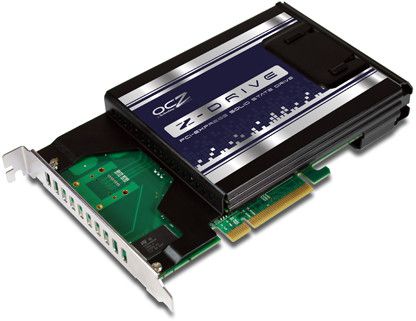From our front-page news:
There has been some doubt over the past few months (especially from competitors) as to whether or not OCZ would deliver their PCI-E "Z-Drive" solid-state disk to market, but according to a press release issued late last week, we should be able to expect immediate availability (as in, availability soon to the end consumer). At the time of this writing, I couldn't find any e-tailers to stock the product, but I'd expect places like Newegg to stock it very soon.
For those unaware, OCZ's Z-Drive is the company's answer to the S-ATA performance bottleneck. Because the drive utilizes the PCI-E bus, speeds faster than what the S-ATA bus can provide are possible. In the case of the P84 1TB drive, 870MB/s Read and 780MB/s Write speeds are possible. That kind of performance is simply a pipe dream where S-ATA drives are concerned.
Because the Z-Drive will be expensive, and understandably so, OCZ has released two versions, the E84 and P84 (I'm unsure what 84 represents). The E version uses SLC chips, so it's faster, and has a longer lifespan, but should also be considerably more expensive. The P version on the other hand sticks to the much more affordable, yet still fast, MLC chips.
Pricing as of press time haven't been made available, but I'd expect these to target only businesses and server environments. Considering each Z-Drive utilizes four standard SSDs in RAID, they're likely to be more expensive than four SSDs of a given speed if you were to buy them individually. Either way, the release of these will hopefully help boost SSDs in the marketplace. The sooner these high-end drives become common, the sooner they become a reality to the end-consumer.

With 8 PCI-E lanes and an internal four-way RAID 0 configuration, the Z-Drive delivers exceptional performance that translates to professional-class data storage in a complete, all-in-one form factor. Additionally, OCZ offers unique customization options for OEM clients that may require tailored hardware or firmware solutions for their business.
Source: OCZ Press Release
For those unaware, OCZ's Z-Drive is the company's answer to the S-ATA performance bottleneck. Because the drive utilizes the PCI-E bus, speeds faster than what the S-ATA bus can provide are possible. In the case of the P84 1TB drive, 870MB/s Read and 780MB/s Write speeds are possible. That kind of performance is simply a pipe dream where S-ATA drives are concerned.
Because the Z-Drive will be expensive, and understandably so, OCZ has released two versions, the E84 and P84 (I'm unsure what 84 represents). The E version uses SLC chips, so it's faster, and has a longer lifespan, but should also be considerably more expensive. The P version on the other hand sticks to the much more affordable, yet still fast, MLC chips.
Pricing as of press time haven't been made available, but I'd expect these to target only businesses and server environments. Considering each Z-Drive utilizes four standard SSDs in RAID, they're likely to be more expensive than four SSDs of a given speed if you were to buy them individually. Either way, the release of these will hopefully help boost SSDs in the marketplace. The sooner these high-end drives become common, the sooner they become a reality to the end-consumer.

With 8 PCI-E lanes and an internal four-way RAID 0 configuration, the Z-Drive delivers exceptional performance that translates to professional-class data storage in a complete, all-in-one form factor. Additionally, OCZ offers unique customization options for OEM clients that may require tailored hardware or firmware solutions for their business.
Source: OCZ Press Release
